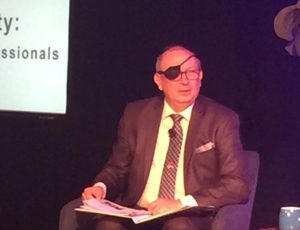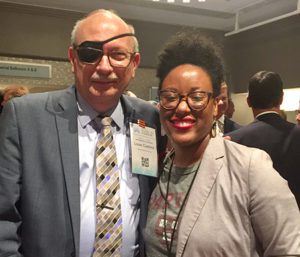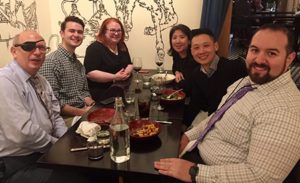Including The “Invisible Minority” in Law Firms and Legal Departments
 Too often blind and low-vision lawyers are invisible to sighted employers, it being mistakenly assumed that because of their disabilities they are unable to perform all the functions of fully-sighted attorneys. That misconception, and ways to address it, were featured in a panel session I moderated at the Minority Corporate Counsel Association‘s Global Tec Conference in San Francisco on April 6, 2019.
Too often blind and low-vision lawyers are invisible to sighted employers, it being mistakenly assumed that because of their disabilities they are unable to perform all the functions of fully-sighted attorneys. That misconception, and ways to address it, were featured in a panel session I moderated at the Minority Corporate Counsel Association‘s Global Tec Conference in San Francisco on April 6, 2019.
“The Invisible Minority” was the first presentation of its kind at an MCCA conference to address visual disabilities in the context of law firms, corporate counsel offices, and other employers of legal services. Tim Elder, a panelist and a blind San Francisco attorney who manages his own firm, TRE Legal, has employed both sighted and blind attorneys. Elder performs all the activities of any litigating lawyer, such as trying cases, negotiating settlements, taking discovery, and counseling his clients, many of them who are also in the disability community. Elder encourages employers and service providers to avoid being targeted by the kind of litigation he files for clients by fully complying with the Americans with Disabilities Act (ADA), and taking a proactive step by being ready to meet the needs of employees with disabilities before they are hired.
Mr. Elder noted that improvements originally designed to aid persons with disabilities have also benefited society more generally: curb cuts not only aid those in wheelchairs, but also parents pushing prams and couriers with delivery carts. Simple courtesies, such as sending PDF documents in electronically readable formats, benefit those who are blind, but also those who are able to read , but might prefer to do so while using an app that reads documents aloud, perhaps during a jog or long ride in the car.
Neil Wilcox, Senior Vice President and General Counsel, Enterprise Shared Services, at USAA, and an MCCA Board Member, has long supported eliminating barriers to employment and services to persons with disabilities, including wounded veterans and their families—USAA’s primary clientele – and women, and other underrepresented communities. He echoed Mr. Elder’s comment that employers should be ready for customers and employees who have disabilities, rather than waiting for them to arrive. Mr. Wilcox commented that companies’ and law firms’ goals should be to meet the individual needs of the customer or employee, so he or she may fully enjoy the service or product, or perform at the highest level he or she can achieve on the job. “It’s a matter of simple courtesy,” he said.
Karae Lisle, CEO of Vista Center for the Blind, noted that there are number of standards to make websites accessible to the blind and persons with low vision. She commented that technology companies are beginning to include artificial intelligence (AI) in hardware and software to assist those who are unable to read. AI capabilities go beyond simply turning printed text into spoken words; an example: using a cell phone’s camera to relay an image to an intelligent program that can identify a product, telling the user what is on the store shelf.
Vista Center employs 12 blind persons who perform a wide range of jobs, with minimal technological assistance besides cell phones. Some no-cost meeting procedures at Vista are familiar to sighted persons who join conference telephone calls, such as having each person identify himself or herself when beginning to speak.
An American Bar Association survey published in 2011 (which is being updated this year) found that among the responding firms not one had a chairperson who had a disability. Attorneys with disabilities are often absent from the top layers of organization charts. Business development efforts create other barriers, such as at golf outings with clients and densely packed conference receptions. In my first experience mentoring a blind person, many years ago in law school, my mentee and life-long friend was aided by a guide dog, but even that expert guide could not find the books the student needed from the library shelf. (This was before electronic research existed.).
The paucity of lawyers with visual disabilities from leadership positions and marketing opportunities may be ending soon. The Mansfield Rule, a trademarked project of Diversity Labs, sets a standard for including minorities and women in job openings, senior positions, and marketing efforts. Kaufman Dolowich & Voluck, LLP is currently test-driving Mansfield version 2.0. In 2020 the Mansfield standards are expected to include persons with disabilities among those who must be considered for responsible positions and client relation efforts.
But why wait for 2020? There’s every reason for law firms, general counsel offices, and all people of good conscience to actively recruit, promote, and include qualified employees who have disabilities, represent minorities, or are women, in job openings, leadership roles, and business development.
Including the “invisible” minority isn’t simply the right thing to do, it’s a smart business practice. Employees who are welcomed with open arms, asked what they need to make them as productive as they can be, and are included in the firm management positions and client relations, are unlikely to jump ship and go to a competitor that does not meet those standards.
My firm, Kaufman Dolowich & Voluck, LLP, is proud to have proposed and moderated this year’s breakthrough panel. As I summed up the presentation, paraphrasing the lyrics of a country song, “We need a little more talk and a lot more action.“
Louie Castoria is Co-Chair Emeritus of the national Professional Liability Practice Group at Kaufman Dolowich & Voluck, LLP, and is a partner in its San Francisco office. He is an independent Mediator and a member of the Mediation Society. He is Founder and CEO of the Coastal Literary Arts Movement, a nonprofit that promotes bilingual literature and journalism in rural coastal communities.
Networking after the presentation:












